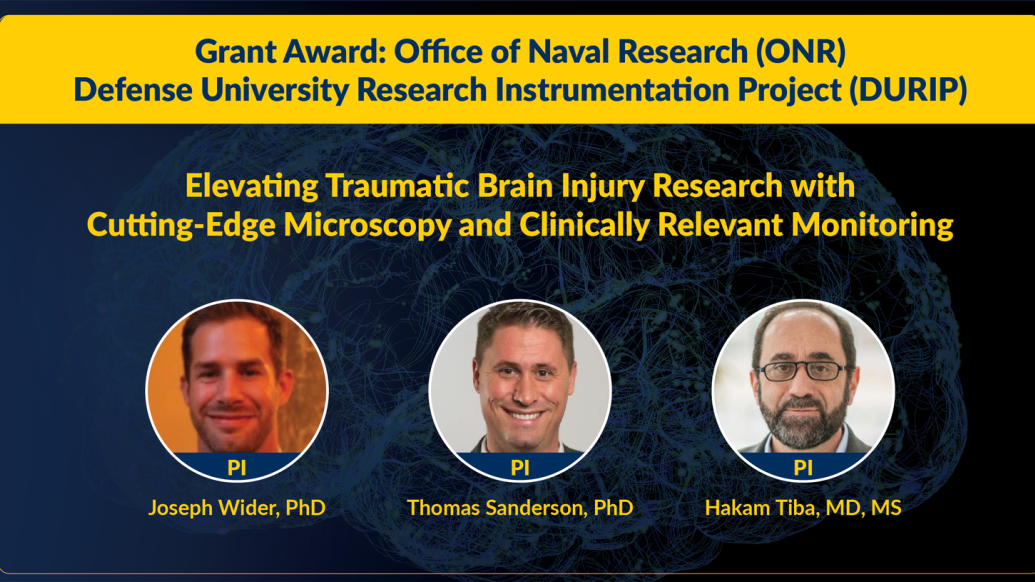Investigators at Michigan Medicine will soon have access to cutting-edge microscopy and monitoring devices not available in many labs.

ANN ARBOR, MI – A team lead by Dr. Joseph Wider in collaboration with the University of Michigan Max Harry Weil Institute for Critical Care Research and Innovation has been awarded $1.2M from the Defense University Research Instrumentation Program (DURIP) of the Office of Naval Research to acquire specialized equipment that will enhance studies of neurologic injury conducted at U-M.
The devices supported by the grant will be housed in the laboratories of Dr. Wider and co-principal investigator Dr. Thomas Sanderson in the Michigan Medicine Department of Emergency Medicine, and will include a super resolution confocal microscope, a high-performance digital slide scanner and an advanced intracranial monitoring platform.
“This system is going to transform how we conduct translational research in brain injury,” said Wider, who is a member of the Weil Institute and Research Assistant Professor of Emergency Medicine. “Across the board, it’s going to allow us to be more sophisticated in how we analyze the intricate events that take place in the brain not only in a setting of traumatic brain injury, but also in stroke and cardiac arrest.”
Providing a Closer Look -- From Organ to Molecule
The combined capabilities of the devices will allow teams to piece together a more holistic picture of the injured brain and its responses to potential therapies through rapid, high-resolution molecular imaging as well as comprehensive monitoring of key brain injury benchmarks.
The super resolution confocal microscope uses an imaging technique called Aryscan joint deconvolution confocal microscopy, which enables 90 nanometer resolution. This super resolution capability is designed to maximize acquisition speed to allow imaging at ultra-high resolution in live cells, permitting real-time imaging of specimens at a high resolution.
“This particular microscope is really the most state-of-the-art when it comes to looking at cells while they’re in culture,” said Dr. Sanderson, Weil Institute member and Associate Professor of Emergency Medicine and Molecular & Integrative Physiology. “It’s going to let us simulate a disease state in cells in a culture dish while monitoring in real time and at a super resolution level, which is something that very few labs can do.”
The slide scanner will enable rapid, automatic digitization of over 100 microscope slides at once through multiple channels, drastically reducing the time needed to perform comprehensive, molecular-level scans of the brain.
Finally, the intracranial monitoring platform will serve to connect several devices so that teams will be able to use a single probe to capture multiple measurements that are crucial to analyzing conditions within the skull, such as intracranial pressure (ICP), temperature and oxygenation.
"This system is going to transform how we conduct translational research in brain injury. It’s going to allow us to be more sophisticated in how we analyze the intricate events that take place in the brain not only in a setting of traumatic brain injury, but also in stroke and cardiac arrest."
Joseph Wider, PhD
Research Assistant Professor, Emergency Medicine; Member, Weil Institute
University of Michigan
A Victory for Future Brain Injury Research
The DURIP award process is administered through a merit competition conducted jointly by the Office of Naval Research, the Air Force Office of Scientific Research and the Army Research Office. The highly competitive program seeks proposals from university investigators who are conducting foundational science and engineering research in areas relevant to national defense, and it supports awarded teams with the funding needed to acquire critical equipment to bolster their work. In fiscal year 2024, the Department of Defense (DoD) awarded a total of $161M in DURIP funding to teams across 39 states, including 7 from the University of Michigan.
“When we started this grant, we wanted to aim high, and were confident we would achieve it,” said co-principal investigator Dr. Hakam Tiba, who serves as Research Associate Professor of Emergency Medicine and is the Director of the Weil Institute’s Preclinical Critical Care Laboratory. “No traditional grant award allows for such equipment in a proposal budget. Our resources at the University of Michigan and at the Weil Institute are what helped make this a success.”
The investigators also credit their victory to the history of support provided through the Weil Institute’s partnership with the Joyce and Don Massey Family Foundation and its annual Massey TBI Grand Challenge program.
Ultimately, the investigators see their equipment system supporting not just their own work, but also that of other current and future translational research teams seeking to bridge the gap from bench to patient impact.
“These machines will not be sitting idle,” said Dr. Tiba. “We will be continuously doing experiments and collecting data and samples that will be utilizing this system in the future. We look forward to this grant opening the doors to many new collaborations.”
About the Weil Institute, formerly MCIRCC
The team at the Max Harry Weil Institute for Critical Care Research and Innovation (formerly the Michigan Center for Integrative Research in Critical Care) is dedicated to pushing the leading edge of research to develop new technologies and novel therapies for the most critically ill and injured patients. Through a unique formula of innovation, integration and entrepreneurship that was first imagined by Weil, their multi-disciplinary teams of health providers, basic scientists, engineers, data scientists, commercialization coaches, donors and industry partners are taking a boundless approach to re-imagining every aspect of critical care medicine. For more information, visit weilinstitute.med.umich.edu.




